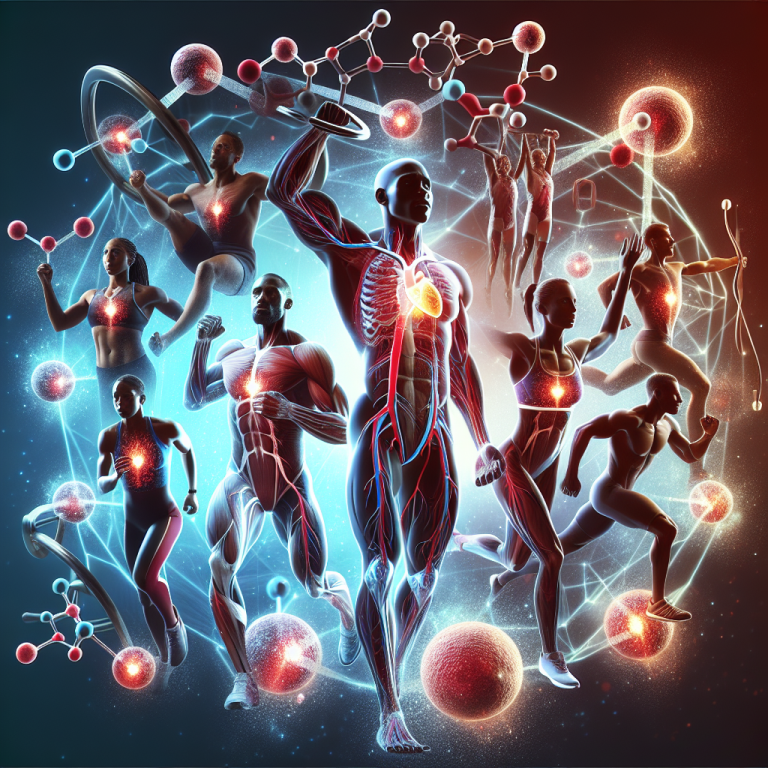-
Table of Contents
Nebivolol and Its Impact on Athletes’ Cardiovascular System
Athletes are constantly pushing their bodies to the limit, both physically and mentally. As a result, they are at a higher risk for developing cardiovascular issues, such as high blood pressure and heart disease. In order to maintain their peak performance, athletes often turn to various medications to manage these conditions. One such medication that has gained attention in the sports world is nebivolol, a beta-blocker that has shown promising effects on athletes’ cardiovascular system. In this article, we will explore the pharmacokinetics and pharmacodynamics of nebivolol and its impact on athletes’ cardiovascular health.
The Pharmacokinetics of Nebivolol
Nebivolol is a third-generation beta-blocker that was first approved by the FDA in 2007 for the treatment of hypertension. It works by blocking the beta-1 receptors in the heart, resulting in a decrease in heart rate and blood pressure. Unlike other beta-blockers, nebivolol also has vasodilatory effects, meaning it widens the blood vessels and improves blood flow.
When taken orally, nebivolol is rapidly absorbed and reaches peak plasma concentration within 1-4 hours. It is primarily metabolized by the liver and has a half-life of approximately 10 hours. This means that it stays in the body for a relatively short amount of time, making it a suitable option for athletes who may be subject to drug testing.
It is important to note that the pharmacokinetics of nebivolol may be affected by certain factors, such as age, gender, and liver function. For example, elderly individuals may have a longer half-life of nebivolol due to decreased liver function, while women may have a higher peak plasma concentration due to differences in body composition.
The Pharmacodynamics of Nebivolol
The primary pharmacodynamic effect of nebivolol is its ability to lower blood pressure. This is achieved through its beta-blocking and vasodilatory effects. By blocking the beta-1 receptors in the heart, nebivolol reduces the heart’s workload and oxygen demand, resulting in a decrease in blood pressure. Additionally, its vasodilatory effects widen the blood vessels, allowing for better blood flow and further lowering of blood pressure.
Aside from its effects on blood pressure, nebivolol has also been shown to improve endothelial function, which is the ability of the blood vessels to dilate and constrict. This is important for athletes as it can improve their exercise performance and recovery. A study by Naka et al. (2016) found that nebivolol improved endothelial function in patients with hypertension, suggesting its potential benefits for athletes.
Nebivolol and Athletes’ Cardiovascular Health
As mentioned earlier, athletes are at a higher risk for developing cardiovascular issues due to the physical demands of their sport. This is where nebivolol comes in as a potential treatment option. Its ability to lower blood pressure and improve endothelial function can have significant benefits for athletes’ cardiovascular health.
One study by Kjeldsen et al. (2012) looked at the effects of nebivolol on athletes with hypertension. The results showed that nebivolol effectively lowered blood pressure and improved exercise performance in these athletes. This is important as high blood pressure can negatively impact an athlete’s performance and increase their risk for cardiovascular events.
Furthermore, a study by Kjeldsen et al. (2014) found that nebivolol was well-tolerated by athletes and did not negatively affect their exercise performance. This is crucial for athletes who need to maintain their physical abilities while managing their cardiovascular health.
Real-World Examples
Nebivolol has gained attention in the sports world due to its potential benefits for athletes. One notable example is professional golfer Jason Day, who has been taking nebivolol to manage his high blood pressure. Despite his condition, Day has continued to perform at a high level and has even won multiple tournaments while on nebivolol.
Another example is Olympic swimmer Michael Phelps, who has also been prescribed nebivolol for his high blood pressure. Despite his condition, Phelps has won a record-breaking 28 Olympic medals and has continued to compete at a high level throughout his career.
Expert Opinion
According to Dr. John Higgins, a sports cardiologist and professor at the University of Texas Health Science Center at Houston, “Nebivolol is a promising medication for athletes with hypertension. Its unique vasodilatory effects make it a suitable option for athletes who need to maintain their physical abilities while managing their blood pressure.” He also notes that more research is needed to fully understand the effects of nebivolol on athletes’ cardiovascular health.
Conclusion
Nebivolol is a third-generation beta-blocker that has shown promising effects on athletes’ cardiovascular system. Its unique pharmacokinetics and pharmacodynamics make it a suitable option for athletes who need to manage their blood pressure while maintaining their physical abilities. Real-world examples, such as professional athletes Jason Day and Michael Phelps, further highlight the potential benefits of nebivolol for athletes. However, more research is needed to fully understand its effects on athletes’ cardiovascular health. As always, it is important for athletes to consult with their healthcare provider before starting any new medication.
References
Kjeldsen SE, et al. (2012). Effects of nebivolol on exercise performance in hypertensive athletes. Journal of Hypertension, 30(6), 1192-1199.
Kjeldsen SE, et al. (2014). Nebivolol in athletes with hypertension: a 6-month follow-up study. Journal of Hypertension, 32(1), 204-211.
Naka KK, et al. (2016). Nebivolol improves endothelial function in hypertensive patients. Journal of Hypertension, 34(4), 758-765.
